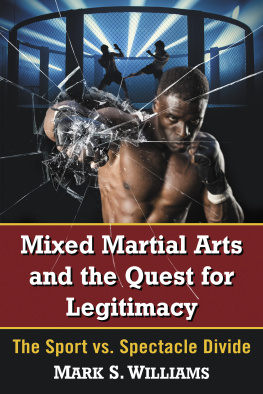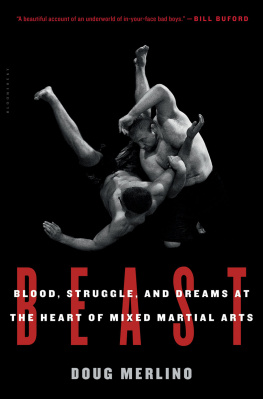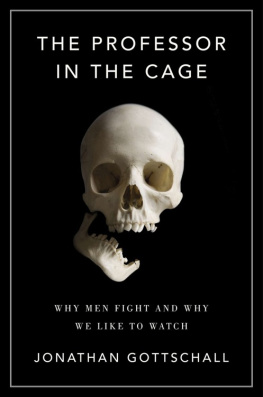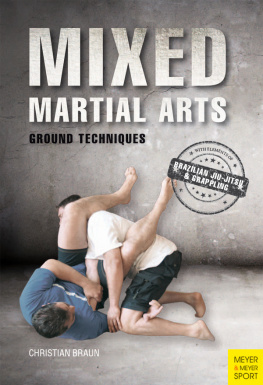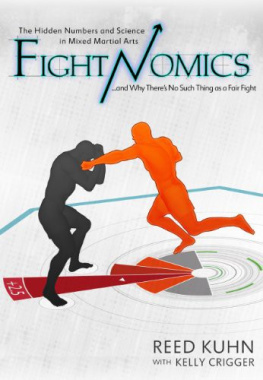
Mixed Martial Arts and the Quest for Legitimacy
The Sport vs. Spectacle Divide
Mark S. Williams

McFarland & Company, Inc., Publishers
Jefferson, North Carolina
LIBRARY OF CONGRESS CATALOGUING DATA ARE AVAILABLE
BRITISH LIBRARY CATALOGUING DATA ARE AVAILABLE
e-ISBN: 978-1-4766-3055-7
2018 Mark S. Williams. All rights reserved
No part of this book may be reproduced or transmitted in any form or by any means, electronic or mechanical, including photocopying or recording, or by any information storage and retrieval system, without permission in writing from the publisher.
Front cover images 2018 iStock
McFarland & Company, Inc., Publishers
Box 611, Jefferson, North Carolina 28640
www.mcfarlandpub.com
Preface
When U.S. Senator John McCain labeled mixed martial arts (MMA) as human cockfighting in the mid1990s, he attached a label that has since haunted the aspirations of MMA to achieve mainstream acceptance as a legitimate sport. This idea of MMA as human cockfighting has persisted in the imaginations of many, many people, and was even indirectly invoked at the 2017 Academy Awards show.
The cockfighting label is a remnant from a different era in the history of a spectacle that had branded itself alternatively as no-holds-barred fighting and ultimate fighting. Groin shots, hair pulling, kicking the head of a downed opponent, head buttsall these tactics were once legal. The only two attacks that were banned from the contests of the early years were eye gouging and biting. Calling it human cockfighting was semi-rhetorical when John McCain said it two decades ago, but the characterization was not entirely facetious.
Today, bouts are contested between consenting adults who receive financial compensation, potentially quite lucrative for a select handful. Contestants are certainly not abused cocks with hot pepper jammed into their anuses to make them feisty. Another difference pertains to the lethality of cockfighting, which is accentuated by the attachment of spurs to the legs of cocks. MMA only allows for unarmed conflict, though the introduction of hand-wraps with 4-ounce gloves was originally mandated to protect fists, not faces and brains, and opened competition up for much more forceful blows. Most importantly, MMA today, unlike cockfighting, dreads the prospect of in-competition death. The UFC has not yet experienced a death in the octagon, or in the direct aftermath of a contest, but other smaller organizations certainly have, or come very close, such as in Bellator in 2016 at the end of a bout contested by two YouTube brawlers well past their athletic primes. While the possibility of an in-cage fatality likely kept Zuffa management awake at night during their ownership of the UFC between 2001 and 2016, the early days of the UFC were much different. Long before Zuffa purchased the brand and vaulted it into the mainstream, the UFC marketed itself as a place where anything could happen, not so subtly promoting the possibility of an in-cage death.
MMA is not cockfighting. It has evolved beyond its gruesome freak-show early years into a modern and sophisticated sport, dominated by highly trained technicians of grappling and striking. Yet there persists a powerful resonance between cage-fighting and cockfighting in the minds of many in society, one that serves to limit its appeal to the public and restricts its acceptance.
Meryl Streeps Oscar speech from early 2017 is only the most recent public condemnation of MMA. After surveying the theatre to give a selectively multinational composite portrayal of Hollywood, Streep breathlessly warned that if America were to kick out the outsiders and foreigners you will have nothing left to watch but football and mixed-martial arts. To dig the knife in a bit further, Streep admonished the choir she was preaching to that mixed-martial arts is not the arts.
Meryl Streep was practicing her right to political expression as an American, and furthermore I sympathize with her political views. America is once again caught in a polarizing era, and I share her concerns regarding the threat to openness and inclusivity the republic is facing. I cringe when I hear my own Canadian politicians, such as Kellie Leitch, play the demagogue in Donald Trump-inspired orations of racially based populism.
While Streeps speech elicited rancorous applause from the millionaire plutocrats of the film industry, half of the MMA community rolled its collective eyes. Once again, MMA is derided on spurious grounds. If Streep ever bothers to descend from her gated community to watch an MMA event with the common people, possibly even to eat some nachos with friends who double-dip into the salsa, and to wash down the taste of other peoples fingers with the best of the worst of American swill, she would likely be struck by how many outsiders and foreigners are to be found on your average UFC card, which must be at least as diverse as #OscarsSoWhite.
Even the promotion of fighters and cards calls attention to the similarities that exist between MMA and the arts. I challenge Meryl Streep to watch a Conor McGregor press conference and deny the artistry involved.
Though one-half of the MMA community rolled its eyes, the other half of the MMA community exuberantly widened its eyes to Streeps comments. Rather than perceiving a denunciation of their sport, Streep had elevated MMA to the lofty status of American football! For a moment, and wholly unintentionally, Streep made MMA fans feel as if they had made it. Not only does Meryl Streep of all people know that MMA exists, but she associated it with football!
MMA is not cockfighting, but there are perhaps parallels between the two. There might even be parallels between cockfighting and Streeps beloved arts, if you look closely enough. The most thoughtful commentary on the cockfight, Deep Play: Notes on the Balinese Cockfight, from the anthropologist Clifford Geertzs The Interpretation of Cultures, a canonical work on ethnography, provides a startling point of departure for reflecting on cage-fighting. It is startling because of how closely the themes explored by Geertz are reflected in MMA today.
Based on his 1950s field notes from visiting Bali, a small island in the Republic of Indonesia only 3.5 kilometers east of Java but strikingly different culturally and politically, Geertz attempted not to interpret the salience of cockfighting to the Balinese, but to understand how the Balinese themselves interpret the social significance of the cockfight. His commentary on gender, inter-village conflict, status, and money evoked many of the contemporary themes that we find in cage-fighting. MMA, like cockfighting, is a sport of masculine virtues, of nationalistic antagonisms, a narrative on evil and the nature of man, and of course, cockfighting and MMA are both intimately connected to gambling. MMA exists in a state of tension between spectacle and sport, and like the cockfight, it is violence as entertainment, but it represents a violence that is not only entertaining, but for many in society, like John McCain and Meryl Streep, quite horrifying.
Geertz was both captivated and horrified by the barbarism of the cockfight, on what makes it so, in his words, disquietful.
The reason it is disquietful is not that it has material effects (it has some, but they are minor); the reason that it is disquietful is that, joining pride to selfhood, selfhood to cocks, and cocks to destruction, it brings to imaginative realization a dimension of Balinese experience well-obscured from view. The transfer of a sense of gravity into what is in itself a rather blank and unvarious spectacle, a commotion of beating wings and throbbing legs, is effected by interpreting it as expressive of something unsettling in the way its authors and audience live, or, even more ominously, what they are.
Next page
